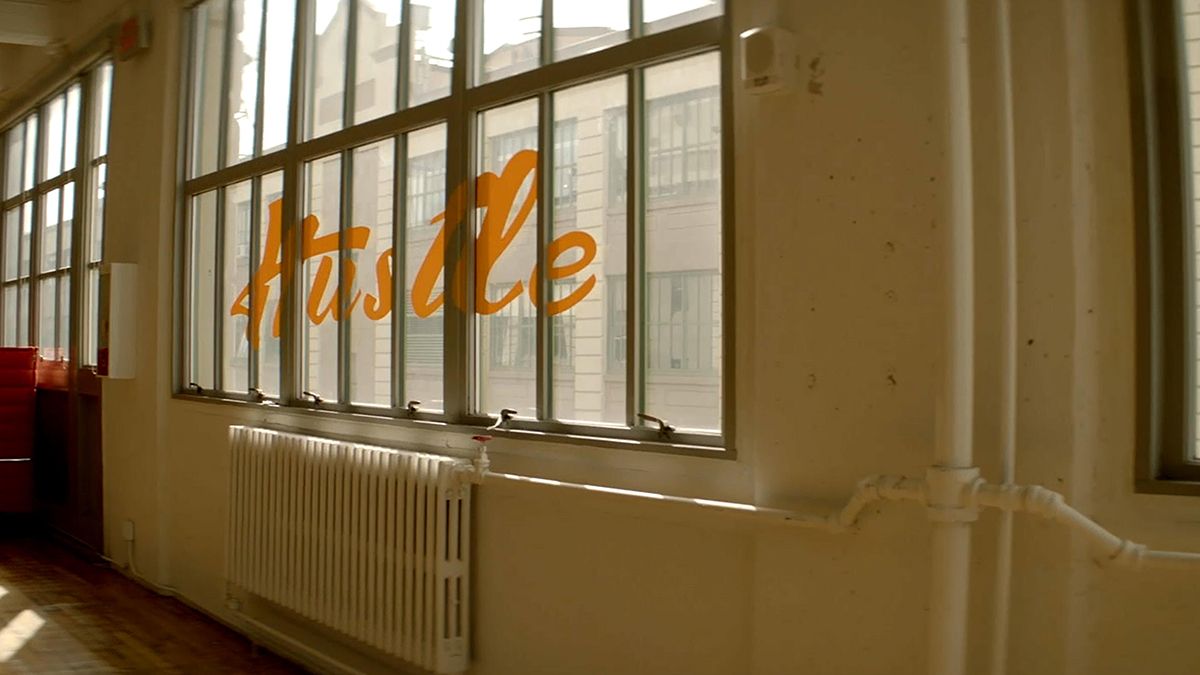[This is a repost of our review from the 2021 SXSW Film Festival. WeWork is now on Hulu.]
I rarely shout at my television. It usually happens during sports. I can’t ever recall it happening during a documentary, and certainly not multiple times. But during Jed Rothstein’s new documentary WeWork: or the Making and Breaking of a $47 Billion Unicorn, I found myself shouting multiple times at WeWork’s messianic co-founder Adam Neumann, “YOU. ARE. A. LANDLORD.” Rothstein’s film works as a piece with other recent documentaries like Fyre: The Greatest Party That Never Happened and The Inventor: Out for Blood in Silicon Valley where we can see how grifters are thriving in an economy that prioritizes “disruption” and aggressive expansion at the expense of long-term sustainability coupled with modest growth. WeWork makes an extreme example of this because while Elizabeth Holmes promised a revolutionary medical device and at the opposite end of the spectrum Billy McFarland promised an incredible party, Neumman’s business was the mundane world of real estate inflated to some kind of revolution in the way people commune. Rothstein skillfully shows how the most remarkable construction of WeWork was Neumann’s bottomless ego.
Founded in 2010, WeWork was founded by Israeli-born Neumann and American Miguel McKelvey, although both were raised in commune-like environments. In the fallout of the Great Recession, the duo conceived of a new idea for working where people could rent communal office space but it would be hip and trendy rather than stodgy and corporate. In the high-stakes, cloistered world of New York City real estate, WeWork’s play was essentially to lease office space and then lease it out to individuals or startups looking for workspace that still jived with a millennial mentality. Where WeWork goes bizarre and then ultimately off the rails was in Neumann’s constant push to make his company more into a lifestyle brand while venture capitalists were looking to disrupt the entire workspace economy. Coupled with a pliant media, that’s how WeWork made it all the way to a $47 billion valuation.
Where WeWork really shines in how it depicts a culture and type of leader that’s becoming disturbing familiar. While humanity has had no shortage of grifters throughout our existence, WeWork, coupled with the aforementioned documentaries, paints a picture of particular kind of con artist who consistently overpromises and under-delivers in an environment where VCs are playing a kind of winner-take-all game with vast sums of money. After all, if Amazon was able to destroy brick-and-mortar retail through market dominance, then why can’t this model apply to any other business?
It’s tempting to place all the blame on Neumann, and WeWork paints him as an almost comically incompetent figure whose malevolence only starts to creep through as things fall apart. But the person of Neumann also perfectly encapsulates the gulf between vision and practice that ends up creating such a wildly overestimated company like WeWork. It was never enough to say, “We’re slowly growing and filling out our workspaces and have set certain targets based on our current rate of growth.” Instead, at its core, WeWork was a real estate company operating like a Silicon Valley tech company burning through vast amount of cash in the hopes that it would achieve market dominance. But unlike a tech company where you’re selling an online experience, WeWork was almost entirely all overhead. At some point, if you’re selling workspace, people need to come into your space. What’s remarkable is how long Neumann was able to obscure this fact with not just fraudulent numbers, but through his personality that painted a grand scope of reinventing community.
It would be nice if these kinds of stories of business hubris only harmed those perpetrating the grift, but as we know all too well by now, the con artists usually flee town with their riches. Neumann made out like a bandit from a company that was basically forced to fire him, and those that bought into WeWork’s hype—the regular people working for the company—were left holding the bag. There’s a cautionary tale here about investing a business with ideals when any business only has the core vision of increasing its profits, but it’s still sad to see fresh-faced people in their early 20s who trusted Neumann’s vision as real and genuine rather than a marketing pitch.
WeWork does go a bit astray in the end in the wake of the COVID-19 pandemic. Rothstein tries to turn his whole ship around by arguing that the distance COVID has created only further cements the importance of community, but he never makes the case that WeWork’s community was anything other than a marketing ploy, a piece of advertising toward a need for connection that was only serving to expand a business. We do need human connection, but that’s not the story of WeWork or Rothstein’s documentary. WeWork is about delusions encouraged by VCs and Silicon Valley mindsets that seek rapid growth regardless of what hard data tells us. It’s a story about how the Emperor had no clothes, and yet we now have an entire infrastructure designed to tell us that nudity is actually the most glorious robe imaginable.
Rating: B+
WeWork premieres on Hulu on April 2nd.



